外研版(2019)选择性必修第三册Unit 6 Nature in Words Using language Grammar 课件(共56张PPT)
文档属性
| 名称 | 外研版(2019)选择性必修第三册Unit 6 Nature in Words Using language Grammar 课件(共56张PPT) |  | |
| 格式 | pptx | ||
| 文件大小 | 5.5MB | ||
| 资源类型 | 教案 | ||
| 版本资源 | 外研版(2019) | ||
| 科目 | 英语 | ||
| 更新时间 | 2024-05-06 22:53:21 | ||
图片预览


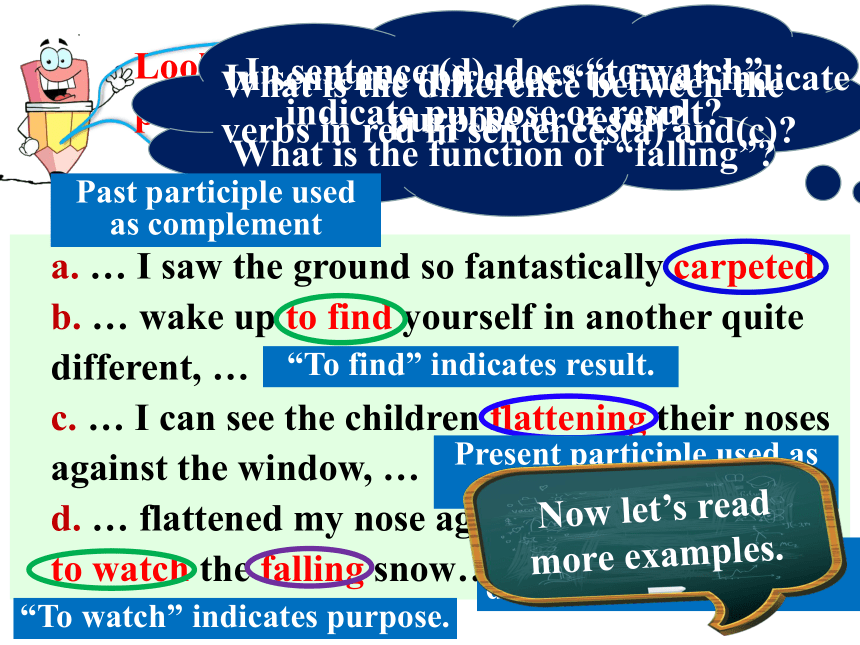
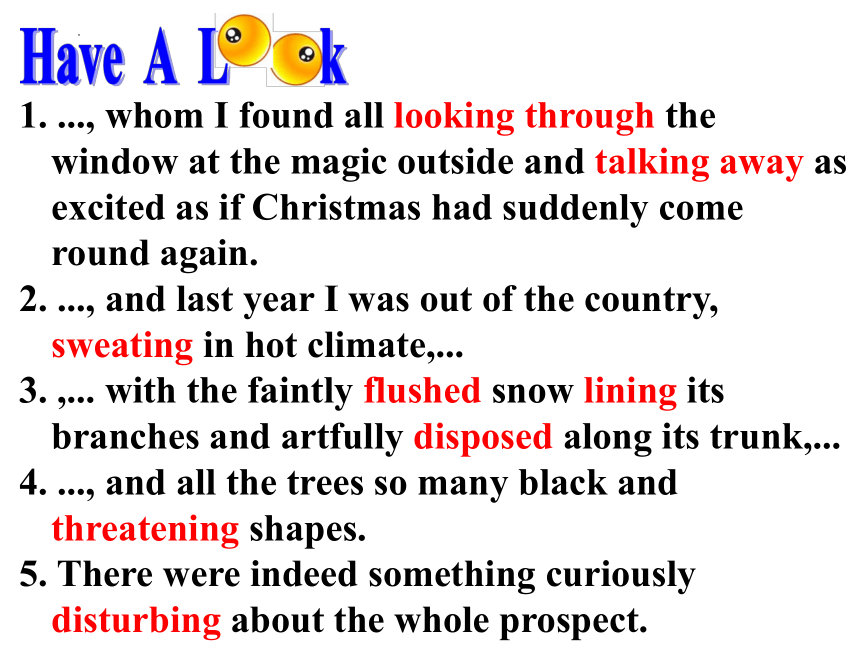
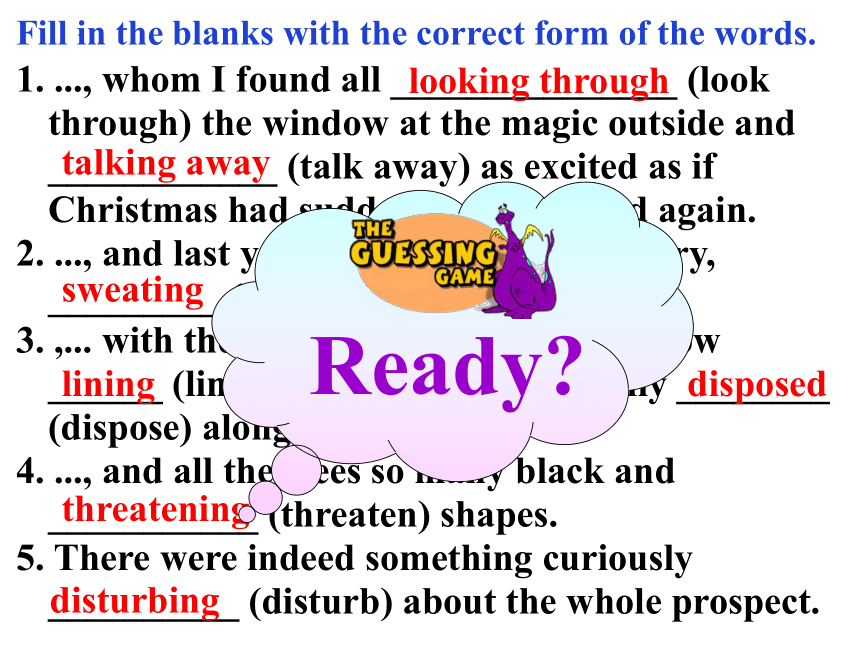
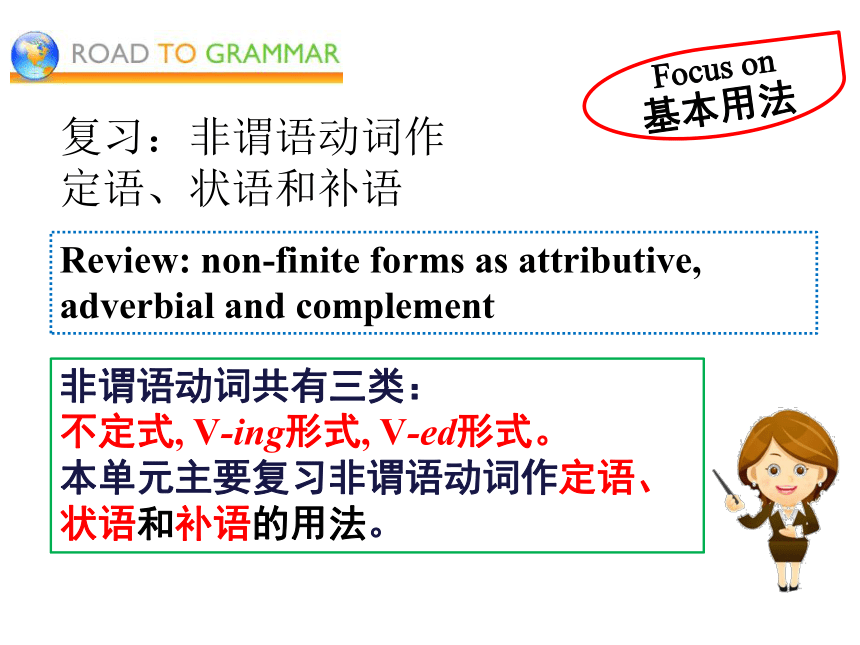
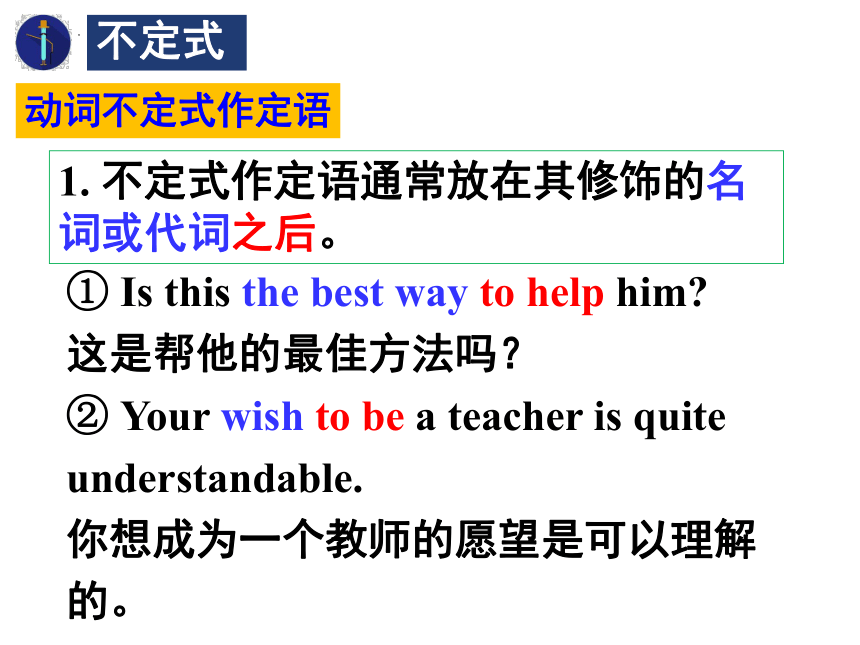


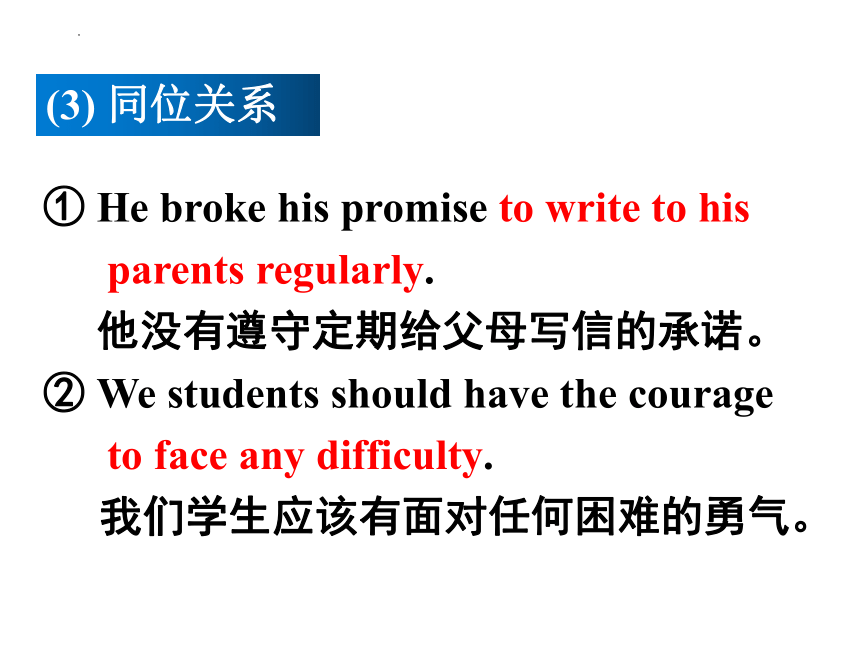
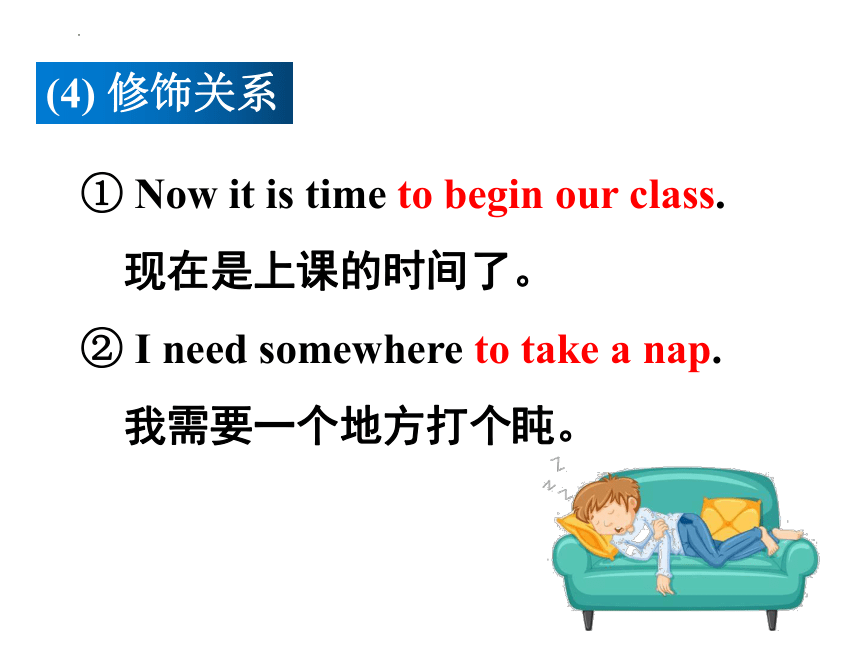
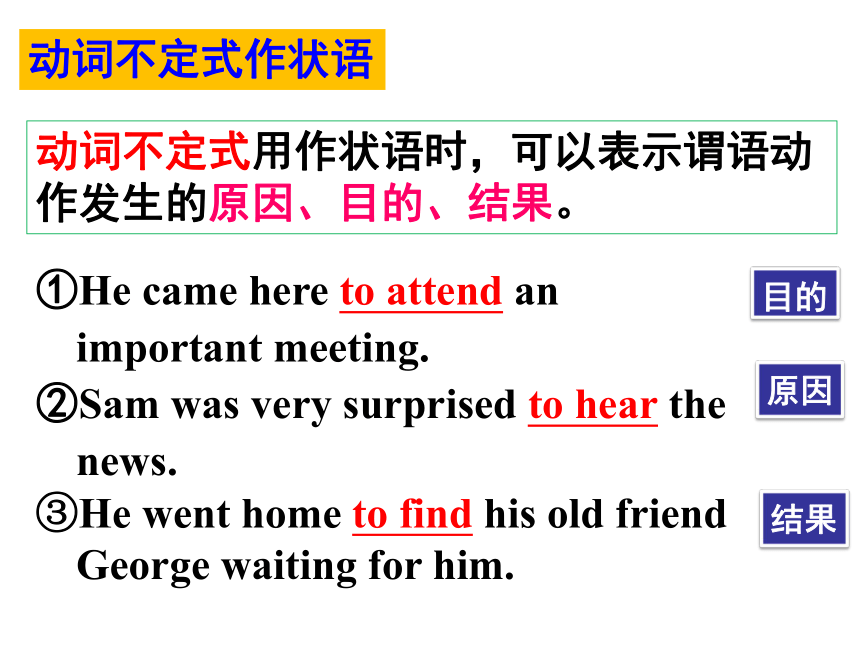
文档简介
(共56张PPT)
Unit 6
Nature in words
Using language
-Grammar
...
我们上节课学了非谓语动词作主语,宾语和表语的用法,你知道它们还可以作什么成分吗?
那让我们再看一些句子,来总结一下吧!
a. … I saw the ground so fantastically carpeted.
b. … wake up to find yourself in another quite different, …
c. … I can see the children flattening their noses against the window, …
d. … flattened my nose against the cold window to watch the falling snow…
Look at the sentences from the reading passage and answer the questions.
What is the difference between the verbs in red in sentences(a) and(c)
In sentence (b), does “to find” indicate purpose or result
Past participle used as complement
Present participle used as complement
“To watch” indicates purpose.
“To find” indicates result.
An attributive is used to describe the snow.
In sentence (d), does “to watch” indicate purpose or result
What is the function of “falling”
Now let’s read more examples.
1. ..., whom I found all looking through the window at the magic outside and talking away as excited as if Christmas had suddenly come round again.
2. ..., and last year I was out of the country, sweating in hot climate,...
3. ,... with the faintly flushed snow lining its branches and artfully disposed along its trunk,...
4. ..., and all the trees so many black and threatening shapes.
5. There were indeed something curiously disturbing about the whole prospect.
1. ..., whom I found all _______________ (look through) the window at the magic outside and ____________ (talk away) as excited as if Christmas had suddenly come round again.
2. ..., and last year I was out of the country, _________ (sweat) in hot climate,...
3. ,... with the faintly ________ (flush) snow ______ (line) its branches and artfully ________ (dispose) along its trunk,...
4. ..., and all the trees so many black and ___________ (threaten) shapes.
5. There were indeed something curiously __________ (disturb) about the whole prospect.
Fill in the blanks with the correct form of the words.
looking through
talking away
sweating
flushed
lining
disposed
threatening
go
Ready
disturbing
非谓语动词共有三类:
不定式, V-ing形式, V-ed形式。
本单元主要复习非谓语动词作定语、状语和补语的用法。
复习:非谓语动词作定语、状语和补语
Focus on
基本用法
Review: non-finite forms as attributive, adverbial and complement
1. 不定式作定语通常放在其修饰的名词或代词之后。
① Is this the best way to help him
这是帮他的最佳方法吗?
② Your wish to be a teacher is quite understandable.
你想成为一个教师的愿望是可以理解的。
不定式
动词不定式作定语
(1) 主谓关系
① He is always the first person to come
and the last one to leave.
他总是第一个来最后一个走。
② The next train to arrive was from
Shenzhen.
下一列到站的火车是从深圳开来的。
2.不定式作定语与被修饰的名词或代词之间是主谓关系、动宾关系、同位关系或修饰关系。
(2) 动宾关系
① The teacher left us a lot of problems to solve.
老师给我们留了很多题要解答。
② Please give me something to drink.
请给我点喝的。
③ He wanted to find a new house to live in.
他想找个新房子住。
当不定式作定语,且与被修饰的词语有逻辑上的动宾关系时,不定式动词应该是及物动词;
若不定式动词为不及物动词,则该动词必须与介词连用,组成及物的动词短语。
(3) 同位关系
① He broke his promise to write to his
parents regularly.
他没有遵守定期给父母写信的承诺。
② We students should have the courage
to face any difficulty.
我们学生应该有面对任何困难的勇气。
(4) 修饰关系
① Now it is time to begin our class.
现在是上课的时间了。
② I need somewhere to take a nap.
我需要一个地方打个盹。
①He came here to attend an important meeting.
②Sam was very surprised to hear the news.
③He went home to find his old friend George waiting for him.
目的
原因
结果
动词不定式用作状语时,可以表示谓语动作发生的原因、目的、结果。
动词不定式作状语
① I'd like you to keep everything tidy.
我希望你能保持每样东西都整洁。
② The teacher asked us to finish the work today.
老师要我们今天完成工作。
③ Can you remind me to phone Ann tomorrow
你能提醒我明天给安打个电话吗?
动词不定式作宾语补足语
1. 带to的不定式
常接带to的不定式作宾补的动词有:want, ask, help, would like, would love, expect, beg, would prefer, would hate, tell, remind, force, enable, teach, order, warn, invite, persuade, get, advise, recommend, encourage, allow, permit, forbid等。
①Her parents wouldn’t let her go out alone.
她父母不会让她独自出门。
②The boss made the workers work 14 hours a day.
老板让工人们每天工作14小时。
③The teacher often has his students read aloud in class.
老师经常让他的学生在教室里大声读。
(1) 用于使役动词let, make, have后面
2. 不带to的不定式
(2) 用于感官动词feel, hear, see, watch等后面
①I felt something crawl up my arm.
我觉得有个东西顺着手臂往上爬。
②Did you hear him go out
你听到他出去了吗?
③They saw the boy fall suddenly from the tree.
他们看见那小男孩突然从树上跌下来。
④They watched the bus disappear into the distance.
他们注视着公共汽车消失在远方。
drinking water =
a walking stick =
a reading room =
a writing desk =
tiring music =
water for drinking 饮用水
a stick for walking 手杖
a room for reading 阅览室
a desk for writing 写字台
music that is tiring 烦人的音乐
1. 单个的v-ing形式作定语位于被修饰名词的前面,既可以表示被修饰者的作用或功能,也可以表示被修饰者的动作或状态。
V-ing形式
V-ing形式作定语
① He is reading something interesting.
他正在读有趣的内容。
② There is nothing amazing.
没什么了不起的。
若单个的v-ing形式修饰的词为those, something, everything, nothing 等代词时,则v-ing形式要放在其后。
①They lived in a room facing the street.
= They lived in a room that faces the street.
他们住在一间面朝街的房子。
②The man standing there is Peter’s father.
= The man who is standing there is Peter’s father.
站在那儿的那个人是彼得的父亲。
③Anybody swimming in this river will be fined.
= Anybody who is swimming in this river will be fined.
任何在这条河里游泳的人都会被罚款。
2. V-ing短语作定语时,放在所修饰的名词之后,并且在意思上相当于一个定语从句。
①His brother, working as a teacher, lives in Beijing.
= His brother, who is working as a teacher, lives in Beijing.
他的哥哥住在北京,是个教师。
②The apple tree, swaying gently in the breeze, had a good crop of fruit.
= The apple tree, which was swaying gently in the breeze, had a good crop of fruit.
那棵苹果树硕果累累,在微风中轻轻摇曳。
3. V-ing短语也可以用作非限制定语,相当于一个非限制性定语从句,这时,它与句子其他部分用逗号隔开。
1. Walking in the street, I saw a tailor's shop.
2. Being poor, he couldn't afford a TV set.
3. His father died, leaving the family even worse off.
4. Using your head, you will find a good way.
5. Studying hard, he didn't pass the exam.
6. He earns a living driving a truck.
7. He sat in the chair reading a newspaper.
时间
原因
结果
条件
让步
方式
伴随
1. When I walked in the street, I saw a tailor’s shop.
2. Because he was poor, he couldn’t afford a TV set.
3. His father died and left the family even worse off.
5. Though he studied hard, he didn’t pass the exam.
4. If you use your head, you will find a good way.
7. He sat in the chair and read a newspaper.
6. He earns a living by driving a truck.
V-ing形式用作状语时,可以表示谓语动作发生的原因、时间、结果、条件、伴随、让步、方式等,作用相当于状语从句或并列句。
V-ing形式作状语
V-ing形式作状语时,它的逻辑主语必须与主句的主语是一致的。
True or false.
① Looking out of the window, a cat was walking along the wall.
② Looking out of the window, we saw a cat walking along the wall.
① Supposing it rains, we will put off the
sports meeting.
② Generally speaking, boys are more
interested in science than girls.
如果下雨,我们就推迟运动会。
一般来说,男孩比女孩对科学更感兴趣。
V–ing 用于某些固定搭配中,
表示说话人的态度、观点等,如:generally speaking, frankly/honestly speaking, judging by/from, considering, seeing, supposing 等等。
① I didn’t notice him waiting.
我没注意到他正在等我。
② I felt an ant climbing over my leg.
我感到一只蚂蚁正在我的腿上爬。
③ Can you smell anything burning
你闻到什么东西正在燃烧吗?
④ I saw him running down the street.
我看见他正沿着街跑。
1. see, watch, hear, feel, notice, smell等感官动词后接v-ing作宾语补足语, 表示该动作正在进行。
V-ing形式作宾语补足语
① They shut the door and left, leaving the fire burning.
他们关上门走了,留下火在燃烧。
② Sorry, I’ve kept you waiting a long time.
对不起,让您久等了。
2. have, leave, keep等使役动词后接v-ing作宾语补足语, 表示“使处于某种状态”。
使役和感官动词之后用v-ing形式和不带to的不定式作宾语补足语的区别:
① We passed by the classroom and saw the
teacher making the experiment.
② We sat an hour and watched the teacher
make the experiment.
我们走过教室,看见老师在做实验。
我们坐了一个小时,看老师做实验。
(只在走过教室的刹那间,看见老师正在做实验)
(一个小时之内一直在看老师做实验)
表示动作正在进行
表示(或强调)动作从开始到结束的全过程
1. 单个v-ed作定语
a. 及物动词的-ed形式作定语时一般兼有被动和完成的意义。
b. 不及物动词的-ed形式作定语时只有完成意义。
①a grown woman 一位成年妇女
②an escaped prisoner 一名逃犯
① a broken cup 一个破杯子
② a wounded soldier 一名伤员
V-ed形式作定语
V-ed形式
① the color TV set produced last year
= the color TV set that was produced last year
去年生产的彩色电视机
② a letter written to me by my daughter
= a letter that was written to me by my
daughter
一封我女儿写给我的信
2. V-ed短语作定语通常后置,其作用相当于一个定语从句。
1. 语态及时间关系不同
V-ing表主动、正在进行或经常性的动作;
V-ed 表被动、动作已经完成
V-ed作定语与V-ing作定语的区别:
an inspiring speech
the inspired audience
the falling leaves 落叶
the fallen leaves 落叶
(正往下落的)
(已落到地面的)
受鼓舞的听众
鼓舞人心的演说
(正在变化的)
(变化了的)
boiling water
boiled water
the changing world
the changed world
(正在沸腾的)
(已经沸腾过的)
fading flowers
faded flowers
(正在凋谢的)
(已经凋谢了的)
a developing country
a developed country
(发展中的)
(发达的)
2. 及物动词的-ed与-ing的被动式都可表示被动, 但v-ed表示一个完成了的动作, 而being done多表示一个正在进行的动作。
①The problem discussed yesterday has something to do with us.
昨天讨论的问题与我们有关。
②The problem being discussed now has something to do with us.
现在正在讨论的问题与我们有关。
1. Asked what had happened, he kept silent.
2. Caught in a heavy rain, he was all wet.
3. Given more time, we would be able to do the
work much better.
4. Left alone at home, the little boy didn’t feel
afraid at all.
5. The teacher entered the classroom, followed by
some students.
时间
原因
条件
让步
伴随
1. When he was asked what had happened, he kept silent.
2. Because he was caught in a heavy rain, he was all wet.
3. If we were given more time, we would be able to do the work much better.
5. The teacher entered the classroom, and he was followed by some students.
4. Although he was left alone at home, the little boy didn’t feel afraid at all.
V-ed形式用作状语时,可以表示谓语动作发生的时间、原因、条件、让步、伴随或方式,相当于状语从句或并列句。
逻辑主语必须与句子的主语一致。
V-ed形式作状语
Unless I am invited, I won’t attend his wedding.
Change the sentences into complete ones.
① When heated, ice will be changed into water.
② Unless invited, I won’t attend his wedding.
③ Once caught smoking in the kitchen, the cook will be fired.
When it is heated, ice will be changed into
water.
Once the cook is caught smoking in the
kitchen, he will be fired.
V-ed作状语有时可保留连词,构成“连词+v-ed”结构,即:
while, when, once, as, though, unless, if 等连词)+v-ed。
①______ (see) from the top of the building, the school looks beautiful.
②______ (see) from the top of the building, we found the school beautiful.
Seen
Seeing
从楼顶上看,学校看起来很美。
我们从楼顶往下看,发现学校很美。
如果句子的主语和分词是主动关系,用v-ing形式。
如果句子的主语和分词是被动关系,用v-ed形式。
1. like, want, wish, order等后面接v-ed作宾语补足语, 表示命令或希望某件事被完成。
① I want the suit made to his own measure.
我想要这套衣服按他自己的尺寸来做。
② He didn't wish it mentioned.
他不希望它被提及。
③ I want the room cleaned up when I come back.
我希望在我回来的时候,房间已清理好。
V-ed形式作宾语补足语
① I saw an old man knocked down by a car just now.
我刚才看到一位老人被车撞倒了。
② He found his home town greatly changed.
他发现自己的家乡大变样了。
2. see, hear, notice, observe, watch, feel, find等感官动词后接v-ed作宾语补足语, 表示该动作与宾语之间是被动关系或者该动作已经完成。
① We're having our car repaired.
我们正在请人修理汽车。
② You’d better keep the guests seated.
你最好让客人坐下。
③ He had his money stolen.
他的钱被偷了。
3. have, get, make, leave, keep等使役动词后接v-ed作宾语补足语, 表示动作由他人完成。
在with的复合结构中可接不定式,v-ing 和v-ed作宾语补足语。这一结构通常在句中作时间、方式、条件、原因等状语。
① With a lot of work to do, he wasn't allowed to go out.
② With spring coming on, trees turn green.
③ With prices going up so fast, we can't afford the rent.
④ With water heated, we can see the steam.
⑤The murderer was brought in, with his hands tied behind his back.
(方式)
(条件)
(原因)
(时间)
(原因)
不定式表示将发生的动作;
V-ing和前面的宾语是逻辑上的主谓关系;
V-ed和前面的宾语是逻辑上的动宾关系。
Complete the passage with the correct form of the verbs in brackets.
The Lake Poets were a small group of poets (live) in the Lake District of England in the late 18th and early 19th centuries. The Lake District, (know) for its beauty, is in the north-west of England. The first of the poets ________________ (come) there was Robert Southey, one of the most (respect) poets of his time. He was followed by William Wordsworth, perhaps Britain's most __________ (celebrate) 19th century poet, and then Samuel Coleridge, who had written the __________ (pioneer) work Lyrical Ballads with Wordsworth. Soon, _______ (draw) both by its natural beauty and a desire to be near these famous poets, other poets came (live) in the Lake District. All of these poets were seen as part of the Romantic Movement.
living
respected
known
to come / coming
to live
drawn
pioneering
celebrated
P65 2
Look at the picture and complete the travel journal entry with the words in the box. Use the structures you have learnt in this unit where appropriate.
Today, whilst walking along a peaceful river running through a university campus, I was amazed to find…
find blow go see
fall relax enjoy run
P65 3
Work in pairs. Talk about a travel experience of your own that brought you closer to nature, using the structures you have learnt in this unit where appropriate.
P65 4
1. ... But 30 years later, the BMI difference between urban and rural people in many countries had narrowed sharply.
This may be due to some disadvantages for people ________(live) in the countryside, including lower levels of income and education, higher costs of healthy foods, and fewer sports facilities. (2021浙江卷1月语言运用第二节)
2. He builds massive sculptures out of plastic garbage, _______ (force) viewers to re-examine their relationship to single-use plastic products.
(2021全国乙卷阅读理解C篇)
living
forcing
3. In 1934, with the passage of the Migratory Bird Hunting Stamp Act (Act), an increasingly concerned nation took firm action _______ (stop) the destruction of migratory (迁徙的) waterfowl and the wetlands so vital to their survival. (2021新高考I卷阅读理解C)
4. I come to you, hat in hand, ____________ (apologize) for the damage I had indirectly caused and to ask you ____________ (reconsider ) my lifetime ban from the hotel. (2021全国甲卷完形填空)
5. A study recently __________ (publish) by Science found that as young as age six, girls are less likely than boys to say that members of their gender are “really, really smart.”(2021全国甲卷阅读理解D)
to stop
to apologize
published
to reconsider
6. Chinese researchers hope to use the instruments onboard Chang’e-4 ______(find) and study areas of the South Pole-Aitken basin. (2020全国卷I语法填空)
7. I like eating frying tomatoes with eggs, and I thought it must be easy to cook.
(2020全国卷I短文改错)
8. They represent the earth ________ (come) back to life and best wishes for new beginnings.
(2020全国卷II语法填空)
9. They make great gifts and you see them many times_________(decorate) with red envelopes and messages of good fortune. (2020全国卷II语法填空)
coming
to find
decorated
fried
10. The next morning he hired a boat and set out ________ (find) the well-known painter.
(2020全国卷III语法填空)
11. And when he saw the mists _______ (rise ) from the river and the soft clouds ____________ (surround) the mountain tops, he was reduced to tears. (2020全国卷III语法填空)
12. Agriculture gave people their first experience of the power of technology __________ (change) lives. (2020浙江卷语法填空)
13. Technological innovations, _________ good marketing, will promote the sales of these products. (2020江苏卷)
A. combined with B. combining with
C. having combined with D. to be combined with
to change
to find
surrounding
rising
14. Picking up her “Lifetime Achievement” award, proud Irene declared she had no plans ________ (retire) from her 36-year-old business.
(2019全国卷II)
15. Not a student Go to the government website ________ (learn) about programs and online tools available to help people under 30 build skills, find a job or start businesses all year round.(2019河北)
16. __________ the convenience of digital payment, many senior citizens started to use smart phones.
(2019江苏)
A. To enjoy B. Enjoying
C. To have enjoyed D. Enjoy
to learn
to retire
17. China's image is improving steadily, with more countries ________ its role in international affairs. (2019江苏)
A. recognizing B. being recognized
C. to be recognized D. recognized
18. A city is the product of human hand and mind, _________ (reflect) man's intelligence and creativity. (2019江苏)
19. Most colleges now offer first-year students a course specially ______ to help them succeed academically and personally.
(2019天津卷)
A. designed B. designing
C. to design D. being designed
reflecting
定语 状语 补语
不定式
V ing
V ed
非谓语动词的句法功能:
类别
成分
√
√
√
√
√
√
√
√
√
Individual activity
I. 选择填空。
1. Susan stood by the window, with her eyes
_______ (focused/focusing) on the car below.
2. Don’t worry, Madam. I will have one waiter
______ (show/to show) you to your room.
3. The washing machines _______ (making/made) by our factory are of high quality.
4. Greatly ___________(inspiring/inspired) by her
stories, many girls wanted to become nurses.
5. ________ (boost) sales, both sellers and producers place a variety of shopping ads in newspapers, magazines, and on the radio and television.
focused
show
made
inspired
To boost
II. 用括号中所给单词的适当形式填空。
1. As is known to us all, China is the third country
________ (send) man into space.
2. When I walked along the street yesterday afternoon, I saw an old man _________(play) the violin.
3. ______ (lose) in thought, Mr. Lee didn’t hear
the sound outside.
4. With all the work _________ (finish), I left the company and went to the bookstore to buy some books for my daughter.
5. The explorers went into the cave with some
equipment, ________(hope) to find some valuable treasures.
to send
playing
Lost
finished
hoping
6. The Greens will do everything they can
_________ (save) the injured dog.
7. Do you know the girl ________(sit) next to our
headmaster
8. They went to the airport in a hurry, only
________ (find) that their flight had been put off.
9. The Great Wall of China, ________(know) as
one of the wonders of the world, attracts a large
number of tourists every year.
10. This experience made me ________ (realize)
that only by working together could a problem
be solved.
to save
sitting
to find
known
realize
III. 阅读下面短文,在空白处填入括号内单词
的正确形式。
The world’s first all-electric airline has successfully completed its test flight, 1. ______ (take) off from the Canadian city of Vancouver and 2. ________(offer) hope that airlines may one day end their polluting emissions.
Civil aviation (民用航空) is one of the fastest
3. _______ (grow) sources of carbon emissions as people increasingly take to the skies and new technologies have been slow to get off the ground.
The e-plane may set a trend for low-cost, more environmentally-friendly flights. The cheaper
flights 4.________ (power) by electricity will change the way people travel and the place where they work. One day, 5._______ (save) time, people will choose to fly to work.
taking
offering
growing
powered
to save
Self-evaluation
Can you use non-finite forms as attributive, adverbial and complement correctly
各个击破
Finish the exercises of the Grammar part .
Unit 6
Nature in words
Using language
-Grammar
...
我们上节课学了非谓语动词作主语,宾语和表语的用法,你知道它们还可以作什么成分吗?
那让我们再看一些句子,来总结一下吧!
a. … I saw the ground so fantastically carpeted.
b. … wake up to find yourself in another quite different, …
c. … I can see the children flattening their noses against the window, …
d. … flattened my nose against the cold window to watch the falling snow…
Look at the sentences from the reading passage and answer the questions.
What is the difference between the verbs in red in sentences(a) and(c)
In sentence (b), does “to find” indicate purpose or result
Past participle used as complement
Present participle used as complement
“To watch” indicates purpose.
“To find” indicates result.
An attributive is used to describe the snow.
In sentence (d), does “to watch” indicate purpose or result
What is the function of “falling”
Now let’s read more examples.
1. ..., whom I found all looking through the window at the magic outside and talking away as excited as if Christmas had suddenly come round again.
2. ..., and last year I was out of the country, sweating in hot climate,...
3. ,... with the faintly flushed snow lining its branches and artfully disposed along its trunk,...
4. ..., and all the trees so many black and threatening shapes.
5. There were indeed something curiously disturbing about the whole prospect.
1. ..., whom I found all _______________ (look through) the window at the magic outside and ____________ (talk away) as excited as if Christmas had suddenly come round again.
2. ..., and last year I was out of the country, _________ (sweat) in hot climate,...
3. ,... with the faintly ________ (flush) snow ______ (line) its branches and artfully ________ (dispose) along its trunk,...
4. ..., and all the trees so many black and ___________ (threaten) shapes.
5. There were indeed something curiously __________ (disturb) about the whole prospect.
Fill in the blanks with the correct form of the words.
looking through
talking away
sweating
flushed
lining
disposed
threatening
go
Ready
disturbing
非谓语动词共有三类:
不定式, V-ing形式, V-ed形式。
本单元主要复习非谓语动词作定语、状语和补语的用法。
复习:非谓语动词作定语、状语和补语
Focus on
基本用法
Review: non-finite forms as attributive, adverbial and complement
1. 不定式作定语通常放在其修饰的名词或代词之后。
① Is this the best way to help him
这是帮他的最佳方法吗?
② Your wish to be a teacher is quite understandable.
你想成为一个教师的愿望是可以理解的。
不定式
动词不定式作定语
(1) 主谓关系
① He is always the first person to come
and the last one to leave.
他总是第一个来最后一个走。
② The next train to arrive was from
Shenzhen.
下一列到站的火车是从深圳开来的。
2.不定式作定语与被修饰的名词或代词之间是主谓关系、动宾关系、同位关系或修饰关系。
(2) 动宾关系
① The teacher left us a lot of problems to solve.
老师给我们留了很多题要解答。
② Please give me something to drink.
请给我点喝的。
③ He wanted to find a new house to live in.
他想找个新房子住。
当不定式作定语,且与被修饰的词语有逻辑上的动宾关系时,不定式动词应该是及物动词;
若不定式动词为不及物动词,则该动词必须与介词连用,组成及物的动词短语。
(3) 同位关系
① He broke his promise to write to his
parents regularly.
他没有遵守定期给父母写信的承诺。
② We students should have the courage
to face any difficulty.
我们学生应该有面对任何困难的勇气。
(4) 修饰关系
① Now it is time to begin our class.
现在是上课的时间了。
② I need somewhere to take a nap.
我需要一个地方打个盹。
①He came here to attend an important meeting.
②Sam was very surprised to hear the news.
③He went home to find his old friend George waiting for him.
目的
原因
结果
动词不定式用作状语时,可以表示谓语动作发生的原因、目的、结果。
动词不定式作状语
① I'd like you to keep everything tidy.
我希望你能保持每样东西都整洁。
② The teacher asked us to finish the work today.
老师要我们今天完成工作。
③ Can you remind me to phone Ann tomorrow
你能提醒我明天给安打个电话吗?
动词不定式作宾语补足语
1. 带to的不定式
常接带to的不定式作宾补的动词有:want, ask, help, would like, would love, expect, beg, would prefer, would hate, tell, remind, force, enable, teach, order, warn, invite, persuade, get, advise, recommend, encourage, allow, permit, forbid等。
①Her parents wouldn’t let her go out alone.
她父母不会让她独自出门。
②The boss made the workers work 14 hours a day.
老板让工人们每天工作14小时。
③The teacher often has his students read aloud in class.
老师经常让他的学生在教室里大声读。
(1) 用于使役动词let, make, have后面
2. 不带to的不定式
(2) 用于感官动词feel, hear, see, watch等后面
①I felt something crawl up my arm.
我觉得有个东西顺着手臂往上爬。
②Did you hear him go out
你听到他出去了吗?
③They saw the boy fall suddenly from the tree.
他们看见那小男孩突然从树上跌下来。
④They watched the bus disappear into the distance.
他们注视着公共汽车消失在远方。
drinking water =
a walking stick =
a reading room =
a writing desk =
tiring music =
water for drinking 饮用水
a stick for walking 手杖
a room for reading 阅览室
a desk for writing 写字台
music that is tiring 烦人的音乐
1. 单个的v-ing形式作定语位于被修饰名词的前面,既可以表示被修饰者的作用或功能,也可以表示被修饰者的动作或状态。
V-ing形式
V-ing形式作定语
① He is reading something interesting.
他正在读有趣的内容。
② There is nothing amazing.
没什么了不起的。
若单个的v-ing形式修饰的词为those, something, everything, nothing 等代词时,则v-ing形式要放在其后。
①They lived in a room facing the street.
= They lived in a room that faces the street.
他们住在一间面朝街的房子。
②The man standing there is Peter’s father.
= The man who is standing there is Peter’s father.
站在那儿的那个人是彼得的父亲。
③Anybody swimming in this river will be fined.
= Anybody who is swimming in this river will be fined.
任何在这条河里游泳的人都会被罚款。
2. V-ing短语作定语时,放在所修饰的名词之后,并且在意思上相当于一个定语从句。
①His brother, working as a teacher, lives in Beijing.
= His brother, who is working as a teacher, lives in Beijing.
他的哥哥住在北京,是个教师。
②The apple tree, swaying gently in the breeze, had a good crop of fruit.
= The apple tree, which was swaying gently in the breeze, had a good crop of fruit.
那棵苹果树硕果累累,在微风中轻轻摇曳。
3. V-ing短语也可以用作非限制定语,相当于一个非限制性定语从句,这时,它与句子其他部分用逗号隔开。
1. Walking in the street, I saw a tailor's shop.
2. Being poor, he couldn't afford a TV set.
3. His father died, leaving the family even worse off.
4. Using your head, you will find a good way.
5. Studying hard, he didn't pass the exam.
6. He earns a living driving a truck.
7. He sat in the chair reading a newspaper.
时间
原因
结果
条件
让步
方式
伴随
1. When I walked in the street, I saw a tailor’s shop.
2. Because he was poor, he couldn’t afford a TV set.
3. His father died and left the family even worse off.
5. Though he studied hard, he didn’t pass the exam.
4. If you use your head, you will find a good way.
7. He sat in the chair and read a newspaper.
6. He earns a living by driving a truck.
V-ing形式用作状语时,可以表示谓语动作发生的原因、时间、结果、条件、伴随、让步、方式等,作用相当于状语从句或并列句。
V-ing形式作状语
V-ing形式作状语时,它的逻辑主语必须与主句的主语是一致的。
True or false.
① Looking out of the window, a cat was walking along the wall.
② Looking out of the window, we saw a cat walking along the wall.
① Supposing it rains, we will put off the
sports meeting.
② Generally speaking, boys are more
interested in science than girls.
如果下雨,我们就推迟运动会。
一般来说,男孩比女孩对科学更感兴趣。
V–ing 用于某些固定搭配中,
表示说话人的态度、观点等,如:generally speaking, frankly/honestly speaking, judging by/from, considering, seeing, supposing 等等。
① I didn’t notice him waiting.
我没注意到他正在等我。
② I felt an ant climbing over my leg.
我感到一只蚂蚁正在我的腿上爬。
③ Can you smell anything burning
你闻到什么东西正在燃烧吗?
④ I saw him running down the street.
我看见他正沿着街跑。
1. see, watch, hear, feel, notice, smell等感官动词后接v-ing作宾语补足语, 表示该动作正在进行。
V-ing形式作宾语补足语
① They shut the door and left, leaving the fire burning.
他们关上门走了,留下火在燃烧。
② Sorry, I’ve kept you waiting a long time.
对不起,让您久等了。
2. have, leave, keep等使役动词后接v-ing作宾语补足语, 表示“使处于某种状态”。
使役和感官动词之后用v-ing形式和不带to的不定式作宾语补足语的区别:
① We passed by the classroom and saw the
teacher making the experiment.
② We sat an hour and watched the teacher
make the experiment.
我们走过教室,看见老师在做实验。
我们坐了一个小时,看老师做实验。
(只在走过教室的刹那间,看见老师正在做实验)
(一个小时之内一直在看老师做实验)
表示动作正在进行
表示(或强调)动作从开始到结束的全过程
1. 单个v-ed作定语
a. 及物动词的-ed形式作定语时一般兼有被动和完成的意义。
b. 不及物动词的-ed形式作定语时只有完成意义。
①a grown woman 一位成年妇女
②an escaped prisoner 一名逃犯
① a broken cup 一个破杯子
② a wounded soldier 一名伤员
V-ed形式作定语
V-ed形式
① the color TV set produced last year
= the color TV set that was produced last year
去年生产的彩色电视机
② a letter written to me by my daughter
= a letter that was written to me by my
daughter
一封我女儿写给我的信
2. V-ed短语作定语通常后置,其作用相当于一个定语从句。
1. 语态及时间关系不同
V-ing表主动、正在进行或经常性的动作;
V-ed 表被动、动作已经完成
V-ed作定语与V-ing作定语的区别:
an inspiring speech
the inspired audience
the falling leaves 落叶
the fallen leaves 落叶
(正往下落的)
(已落到地面的)
受鼓舞的听众
鼓舞人心的演说
(正在变化的)
(变化了的)
boiling water
boiled water
the changing world
the changed world
(正在沸腾的)
(已经沸腾过的)
fading flowers
faded flowers
(正在凋谢的)
(已经凋谢了的)
a developing country
a developed country
(发展中的)
(发达的)
2. 及物动词的-ed与-ing的被动式都可表示被动, 但v-ed表示一个完成了的动作, 而being done多表示一个正在进行的动作。
①The problem discussed yesterday has something to do with us.
昨天讨论的问题与我们有关。
②The problem being discussed now has something to do with us.
现在正在讨论的问题与我们有关。
1. Asked what had happened, he kept silent.
2. Caught in a heavy rain, he was all wet.
3. Given more time, we would be able to do the
work much better.
4. Left alone at home, the little boy didn’t feel
afraid at all.
5. The teacher entered the classroom, followed by
some students.
时间
原因
条件
让步
伴随
1. When he was asked what had happened, he kept silent.
2. Because he was caught in a heavy rain, he was all wet.
3. If we were given more time, we would be able to do the work much better.
5. The teacher entered the classroom, and he was followed by some students.
4. Although he was left alone at home, the little boy didn’t feel afraid at all.
V-ed形式用作状语时,可以表示谓语动作发生的时间、原因、条件、让步、伴随或方式,相当于状语从句或并列句。
逻辑主语必须与句子的主语一致。
V-ed形式作状语
Unless I am invited, I won’t attend his wedding.
Change the sentences into complete ones.
① When heated, ice will be changed into water.
② Unless invited, I won’t attend his wedding.
③ Once caught smoking in the kitchen, the cook will be fired.
When it is heated, ice will be changed into
water.
Once the cook is caught smoking in the
kitchen, he will be fired.
V-ed作状语有时可保留连词,构成“连词+v-ed”结构,即:
while, when, once, as, though, unless, if 等连词)+v-ed。
①______ (see) from the top of the building, the school looks beautiful.
②______ (see) from the top of the building, we found the school beautiful.
Seen
Seeing
从楼顶上看,学校看起来很美。
我们从楼顶往下看,发现学校很美。
如果句子的主语和分词是主动关系,用v-ing形式。
如果句子的主语和分词是被动关系,用v-ed形式。
1. like, want, wish, order等后面接v-ed作宾语补足语, 表示命令或希望某件事被完成。
① I want the suit made to his own measure.
我想要这套衣服按他自己的尺寸来做。
② He didn't wish it mentioned.
他不希望它被提及。
③ I want the room cleaned up when I come back.
我希望在我回来的时候,房间已清理好。
V-ed形式作宾语补足语
① I saw an old man knocked down by a car just now.
我刚才看到一位老人被车撞倒了。
② He found his home town greatly changed.
他发现自己的家乡大变样了。
2. see, hear, notice, observe, watch, feel, find等感官动词后接v-ed作宾语补足语, 表示该动作与宾语之间是被动关系或者该动作已经完成。
① We're having our car repaired.
我们正在请人修理汽车。
② You’d better keep the guests seated.
你最好让客人坐下。
③ He had his money stolen.
他的钱被偷了。
3. have, get, make, leave, keep等使役动词后接v-ed作宾语补足语, 表示动作由他人完成。
在with的复合结构中可接不定式,v-ing 和v-ed作宾语补足语。这一结构通常在句中作时间、方式、条件、原因等状语。
① With a lot of work to do, he wasn't allowed to go out.
② With spring coming on, trees turn green.
③ With prices going up so fast, we can't afford the rent.
④ With water heated, we can see the steam.
⑤The murderer was brought in, with his hands tied behind his back.
(方式)
(条件)
(原因)
(时间)
(原因)
不定式表示将发生的动作;
V-ing和前面的宾语是逻辑上的主谓关系;
V-ed和前面的宾语是逻辑上的动宾关系。
Complete the passage with the correct form of the verbs in brackets.
The Lake Poets were a small group of poets (live) in the Lake District of England in the late 18th and early 19th centuries. The Lake District, (know) for its beauty, is in the north-west of England. The first of the poets ________________ (come) there was Robert Southey, one of the most (respect) poets of his time. He was followed by William Wordsworth, perhaps Britain's most __________ (celebrate) 19th century poet, and then Samuel Coleridge, who had written the __________ (pioneer) work Lyrical Ballads with Wordsworth. Soon, _______ (draw) both by its natural beauty and a desire to be near these famous poets, other poets came (live) in the Lake District. All of these poets were seen as part of the Romantic Movement.
living
respected
known
to come / coming
to live
drawn
pioneering
celebrated
P65 2
Look at the picture and complete the travel journal entry with the words in the box. Use the structures you have learnt in this unit where appropriate.
Today, whilst walking along a peaceful river running through a university campus, I was amazed to find…
find blow go see
fall relax enjoy run
P65 3
Work in pairs. Talk about a travel experience of your own that brought you closer to nature, using the structures you have learnt in this unit where appropriate.
P65 4
1. ... But 30 years later, the BMI difference between urban and rural people in many countries had narrowed sharply.
This may be due to some disadvantages for people ________(live) in the countryside, including lower levels of income and education, higher costs of healthy foods, and fewer sports facilities. (2021浙江卷1月语言运用第二节)
2. He builds massive sculptures out of plastic garbage, _______ (force) viewers to re-examine their relationship to single-use plastic products.
(2021全国乙卷阅读理解C篇)
living
forcing
3. In 1934, with the passage of the Migratory Bird Hunting Stamp Act (Act), an increasingly concerned nation took firm action _______ (stop) the destruction of migratory (迁徙的) waterfowl and the wetlands so vital to their survival. (2021新高考I卷阅读理解C)
4. I come to you, hat in hand, ____________ (apologize) for the damage I had indirectly caused and to ask you ____________ (reconsider ) my lifetime ban from the hotel. (2021全国甲卷完形填空)
5. A study recently __________ (publish) by Science found that as young as age six, girls are less likely than boys to say that members of their gender are “really, really smart.”(2021全国甲卷阅读理解D)
to stop
to apologize
published
to reconsider
6. Chinese researchers hope to use the instruments onboard Chang’e-4 ______(find) and study areas of the South Pole-Aitken basin. (2020全国卷I语法填空)
7. I like eating frying tomatoes with eggs, and I thought it must be easy to cook.
(2020全国卷I短文改错)
8. They represent the earth ________ (come) back to life and best wishes for new beginnings.
(2020全国卷II语法填空)
9. They make great gifts and you see them many times_________(decorate) with red envelopes and messages of good fortune. (2020全国卷II语法填空)
coming
to find
decorated
fried
10. The next morning he hired a boat and set out ________ (find) the well-known painter.
(2020全国卷III语法填空)
11. And when he saw the mists _______ (rise ) from the river and the soft clouds ____________ (surround) the mountain tops, he was reduced to tears. (2020全国卷III语法填空)
12. Agriculture gave people their first experience of the power of technology __________ (change) lives. (2020浙江卷语法填空)
13. Technological innovations, _________ good marketing, will promote the sales of these products. (2020江苏卷)
A. combined with B. combining with
C. having combined with D. to be combined with
to change
to find
surrounding
rising
14. Picking up her “Lifetime Achievement” award, proud Irene declared she had no plans ________ (retire) from her 36-year-old business.
(2019全国卷II)
15. Not a student Go to the government website ________ (learn) about programs and online tools available to help people under 30 build skills, find a job or start businesses all year round.(2019河北)
16. __________ the convenience of digital payment, many senior citizens started to use smart phones.
(2019江苏)
A. To enjoy B. Enjoying
C. To have enjoyed D. Enjoy
to learn
to retire
17. China's image is improving steadily, with more countries ________ its role in international affairs. (2019江苏)
A. recognizing B. being recognized
C. to be recognized D. recognized
18. A city is the product of human hand and mind, _________ (reflect) man's intelligence and creativity. (2019江苏)
19. Most colleges now offer first-year students a course specially ______ to help them succeed academically and personally.
(2019天津卷)
A. designed B. designing
C. to design D. being designed
reflecting
定语 状语 补语
不定式
V ing
V ed
非谓语动词的句法功能:
类别
成分
√
√
√
√
√
√
√
√
√
Individual activity
I. 选择填空。
1. Susan stood by the window, with her eyes
_______ (focused/focusing) on the car below.
2. Don’t worry, Madam. I will have one waiter
______ (show/to show) you to your room.
3. The washing machines _______ (making/made) by our factory are of high quality.
4. Greatly ___________(inspiring/inspired) by her
stories, many girls wanted to become nurses.
5. ________ (boost) sales, both sellers and producers place a variety of shopping ads in newspapers, magazines, and on the radio and television.
focused
show
made
inspired
To boost
II. 用括号中所给单词的适当形式填空。
1. As is known to us all, China is the third country
________ (send) man into space.
2. When I walked along the street yesterday afternoon, I saw an old man _________(play) the violin.
3. ______ (lose) in thought, Mr. Lee didn’t hear
the sound outside.
4. With all the work _________ (finish), I left the company and went to the bookstore to buy some books for my daughter.
5. The explorers went into the cave with some
equipment, ________(hope) to find some valuable treasures.
to send
playing
Lost
finished
hoping
6. The Greens will do everything they can
_________ (save) the injured dog.
7. Do you know the girl ________(sit) next to our
headmaster
8. They went to the airport in a hurry, only
________ (find) that their flight had been put off.
9. The Great Wall of China, ________(know) as
one of the wonders of the world, attracts a large
number of tourists every year.
10. This experience made me ________ (realize)
that only by working together could a problem
be solved.
to save
sitting
to find
known
realize
III. 阅读下面短文,在空白处填入括号内单词
的正确形式。
The world’s first all-electric airline has successfully completed its test flight, 1. ______ (take) off from the Canadian city of Vancouver and 2. ________(offer) hope that airlines may one day end their polluting emissions.
Civil aviation (民用航空) is one of the fastest
3. _______ (grow) sources of carbon emissions as people increasingly take to the skies and new technologies have been slow to get off the ground.
The e-plane may set a trend for low-cost, more environmentally-friendly flights. The cheaper
flights 4.________ (power) by electricity will change the way people travel and the place where they work. One day, 5._______ (save) time, people will choose to fly to work.
taking
offering
growing
powered
to save
Self-evaluation
Can you use non-finite forms as attributive, adverbial and complement correctly
各个击破
Finish the exercises of the Grammar part .
